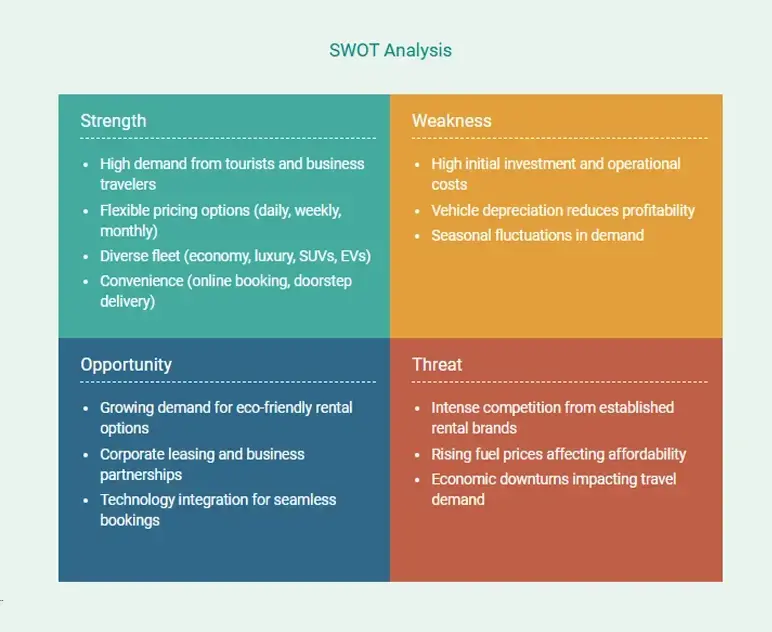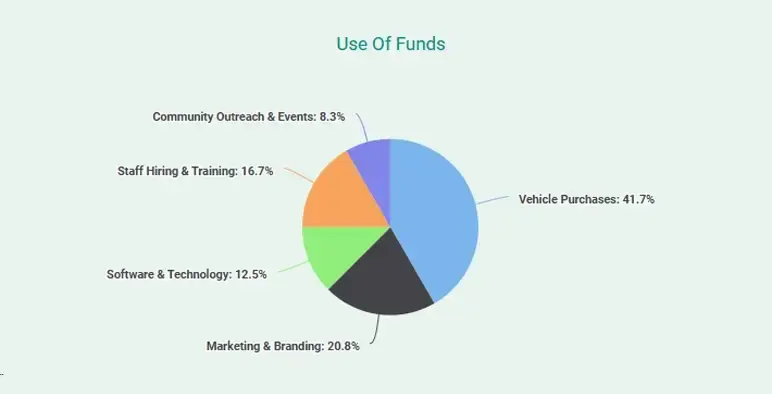You see the demand, the opportunity, and the potential to build a successful car rental business. But before you hand over the keys to your first customer, you need a solid plan to make it work.
That’s exactly what Mike Jaberi learned when he set out to launch his car rental company.
I recently spoke with Mike about his journey—how he streamlined operations, tackled industry challenges, and built a standout car rental business.
From that conversation, I’ve put together this guide to help you create a winning car rental business plan. Let’s take a closer look!
Why need to write a car rental business plan?
Starting a car rental business takes more than just having cars—it requires a solid plan to ensure profitability and long-term success. Here’s how a business plan helps:
- Define your market – Who are your target customers, and what do they need?
- Set competitive pricing – Determine your pricing strategy to remain both profitable and appealing to customers.
- Manage expenses – Know the costs related to things like vehicle purchases, maintenance, and insurance to prevent financial issues.
- Stay compliant – This way, you don’t forget to get important licenses and insurance, a plan.
- Secure funding – Investors and lenders require financial projections and growth plans to invest in your business.
In short, think of your business plan as a clear roadmap that allows you to stay focused, minimize risks, and build a successful car rental venture.
Key components of a car rental agency business plan
Here’s a step-by-step guide to help you write an effective business plan for your car rental company in 9 easy steps:

1. Executive Summary
The executive summary is a brief, high-level overview of your car rental business plan, highlighting its key points. Although it appears first, it’s best to write it last to ensure it accurately reflects your entire plan.
Here’s what to include in your executive summary:
- Business name and location
- Vision and mission statement
- Services offered (types of rentals, vehicle options, and any unique services)
- Market opportunity
- Unique selling propositions (USPs)
- Financial highlights
The primary goal of your plan summary is to grab the reader’s attention by presenting your unique business concept and showcasing its potential in the market. So, keep it short, compelling, and impactful!
"Writing the executive summary for Fox Rent a Car was trickier than I expected.
At first, I tried cramming in every little detail about our fleet, pricing strategy, and market position, but it quickly became overwhelming.
Then, I realized the summary must be clear and punchy. So, I just focused on the essentials—who we are, what we do, what makes us different, and what the market opportunity looks like.
That small shift made a huge difference."—Mike Jaberi
2. Company Overview
The company overview section gives a clear picture of your car rental company, explaining its purpose and what makes it unique.
It’s all about defining the key purpose of your business, including why you have started the car rental business and what at.
The following are the key elements to include in your business overview section:
- Registered business name & location
- Legal structure
- Ownership
- Mission & core values
- Car rental history and milestones (if any)
- Future goals
This section helps establish your business identity, build trust, and highlight what makes your car rental agency stand out. Keep it engaging and informative!
"The real challenge was making the business description sound natural while explaining why we started in the first place. I didn’t want it to feel like a boring corporate write-up.
So, I took a step back and thought about why we built Fox Rent a Car in the first place—to offer affordable, no-hassle rentals in a market full of overpriced, complicated options.
Once I framed it that way, the section started feeling real and relatable instead of just a list of facts.”—Mike Jaberi
3. Services Offered
This section explains what your car rental business provides, who it serves, and why it stands out. Clear and well-structured services make it easier for customers to find the right option.
Here are a few key questions to guide this section:
- What do you offer? A variety of rental options, from budget to luxury.
- Who are your services for? Tourists, business travelers, or locals needing temporary transport.
- Where do you operate? City-based, airport services, or multiple locations.
- When are your services needed? Short-term, long-term, or subscription-based rentals.
- How do customers book? Online, app-based, or walk-in reservations.
To make it easier for customers to choose the right option, categorize your services based on their needs and usage. For example:
| Category | Description | Target Customers |
|---|---|---|
| Standard Rentals | Affordable cars for everyday use | Budget-conscious customers, daily commuters |
| Luxury & Premium Rentals | High-end vehicles for special occasions or business | Business professionals, luxury seekers |
| Long-term & Subscription Rentals | Flexible plans for extended use, with discounts | Expats, corporate clients, long-term renters |
| Airport & Business Services | Convenient pick-up/drop-off options at airports and business hubs | Frequent travelers, corporate clients |
| Specialty Vehicle Rentals | Unique offerings like electric cars, SUVs, or sports cars | Eco-conscious drivers, adventure seekers |
| Chauffeur Services | Professional drivers for a hassle-free experience | VIP clients, tourists, event attendees |
A clear and well-defined service list helps attract the right customers and grow your business.
“Early on, we assumed customers understood our services just because we offered them. But confusion led to missed opportunities.
We fixed this by simplifying how we explained what we do—using clear, direct language that focused on customer needs. Once people could quickly see the value, trust grew, and so did our business.
The lesson? If customers don’t immediately understand your service, you’re making it too complicated.”—Mike Jaberi
4. Industry and Market Research
Market research is essential to understanding the car rental industry, your customers, and the latest market trends.
Begin by pinpointing your ideal clientele—are they vacationers, corporate travelers, or residents seeking short-term transport? Comprehending their requirements will guide the development of your services.
Then, look for gaps in the market, such as luxury rentals, electric vehicles, or flexible subscription-based options, to position your business as a top choice.
Moreover, stay informed about market trends. Are customers focusing on self-drive rentals, mobile app bookings, or environmentally friendly vehicle choices?
Finally, analyze pricing strategies. Will your business offer budget-friendly rentals, premium services, or a mix of both?
Make sure you align your pricing strategy with your target audience and competition to stay competitive.
"When we started, I thought offering a good service was enough. But I quickly learned that without understanding the market, even the best businesses struggle.
One of our biggest challenges was predicting shifts in customer demand and competitive pricing. We overcame this by constantly analyzing trends, studying competitors, and listening to what customers actually needed.
Always remember —it’s an ongoing process that helps you stay ahead and make informed decisions. The more you know, the better you can adapt and grow." —Mike Jaberi
5. Competitor Analysis
Knowing your competition helps you find ways to stand out in the car rental industry.
Start by looking at other rental businesses—both local and well-known brands. Check what types of vehicles they offer, their prices, their rental terms, and how they treat customers.
Further, see what they do well, like easy online booking or a wide range of cars, and where they fall short, like high deposits or poor customer service.
From that, figure out what makes your business better. Maybe you offer lower fees, flexible rental options, or a unique selection, like electric or luxury cars.
Additionally, conducting a SWOT analysis can help you plan ahead. Think about challenges like changing fuel prices, seasonal demand, or new rules in the car rental industry.

By understanding your competition, you can make smarter decisions and build a strong, successful business.
"Early on, we took some competitors very lightly, which cost us time and resources. The real lesson came when we stopped reacting and started studying them closely.
We learned what they did well, where they fell short, and how we could offer something better.
This competitive analysis helped us find the gaps and leave competitors behind by highlighting our competitive advantage."—Mike Jaberi
6. Marketing Plan
A solid marketing plan helps attract new customers, retain existing ones, and boost revenue. Here are some effective strategies for your car rental business:
Marketing strategies:
- Build an online presence with a business website & social media.
- Use local ads, promotions, and partnerships with hotels or travel agencies.
- Offer discounts for first-time customers & referral programs.
- Run targeted Google Ads & social media campaigns.
- Partner with influencers & travel bloggers.
Sales strategies:
- Upsell add-ons like GPS, insurance, or premium vehicles.
- Offer long-term rental discounts & corporate plans.
- Implement a loyalty program for repeat customers.
- Encourage word-of-mouth referrals with incentives.
A well-planned sales and marketing strategy assists you in steady bookings and business growth!
“If I had to give one piece of advice, it would be to meet your customers where they are. Too many businesses waste time on every marketing channel instead of focusing on the ones that actually matter.
And never underestimate the power of customer feedback—it builds trust and attracts new clients faster than any ad campaign.
A small discount for first-time customers can also go a long way in getting people through the door without undercutting your value."—Mike Jaberi
7. Management Team and Organization
Successfully operating a car rental company demands a skilled team. From managing reservations to servicing vehicles, each position contributes to customer satisfaction and operational efficiency.
If you are overseeing the business on your own, describe how you plan to address essential responsibilities such as bookings, client assistance, advertising, vehicle upkeep, and financial matters. Emphasize any experience or skills that make you a great fit for the role.
If you have a small team, including a fleet manager, sales and marketing manager, finance manager, as well as rental agents, introduce them. And explain how they benefit your car rental business.
You can also include a simple organizational chart to show how the team is structured and how each role connects. For example:

A well-managed team leads to better car rental service, happy customers, and a successful business!
"The tricky part was proving to investors that my team could actually run the business, especially since I hadn't personally managed a car rental company before.
Hence, I focused on hiring people who had solid experience—like bringing on a manager who'd already spent years working with cars, plus customer service people who had backgrounds in hotels or travel businesses."— Mike Jaberi
8. Operations Plan
A well-structured operations plan ensures your car rental business runs smoothly every day. So, try to cover all your operational intricacies and show readers you’ve thought through every aspect of your business.
Here’s what to include in the operations plan:
- Business hours & staffing: Specify your operating hours and staff schedules.
- Fleet management & maintenance: Describe how the cars will be washed, serviced, and checked frequently for safety and reliability.
- Booking & payments: Describe your reservation system. Will the customers book online, by phone, or walk in?
- Insurance & compliance: Cover the legal requirements, including rental agreements, insurance policies, and local regulations, to ensure hassle-free operations.
With a clear operations plan, your business can offer reliable service, keep customers happy, and stay ahead in the competitive car rental market!
"Planning how we'd handle customer bookings efficiently was challenging at first. I wasn't really sure whether we should prioritize online reservations, phone bookings, or walk-in customers.
To keep things simple and organized, I invested in a reliable online booking system and make our booking process smoother.
Honestly, this was a great choice because it automated the booking reservations, showed vehicle availability instantly, and made keeping track of customer details and rental histories super easy."—Mike Jaberi
9. Financial Projections
Your financial plan shows how your car rental business will make money, manage costs, and stay profitable. Here’s what to include in your car rental financial plan:
- Revenue forecast (income based on rental rates, fleet size, and expected bookings)
- Expense breakdown (startup costs)
- Financial statements (Income, balance sheet, cash flow statement)
- Break-even analysis
- Funding needs (if applicable)
Besides that, explain how you’ll use the funds—whether for vehicle purchases, insurance, marketing, or expanding your fleet. For instance:

Further, consider including potential risks that could affect your finances, like market changes, seasonal demand, and vehicle maintenance costs. Plan for these by setting aside extra funds, adjusting prices when needed, and keeping a well-balanced fleet.
"Creating realistic financial projections was the hardest part for me. Honestly, numbers have never been my strongest area.
So, at first, I felt overwhelmed trying to estimate monthly income, predict expenses, and keep everything realistic.
To make things clearer and easier to manage, I decided to use financial forecasting tools that really simplified the process and helped me organize everything effectively."—Mike Jaberi
Download a free car rental business plan template
Ready to start crafting your own car rental business plan from scratch but need a little extra help? No worries; we're here for you! Download our free car rental business plan template PDF to help get started.
This simple template has assisted various entrepreneurs in successfully starting their car rental businesses. Through practical examples and insights, it guides you through the essential elements of creating a strong business plan that captivates investors.
Get help drafting your plan
We’ve covered everything you need to know about writing a car rental business plan and shared useful tips to make the process easier.
But if you’re still unsure or need expert help, our business plan consultants are here for you! They will help you create an investor-ready plan as well as fine-tune your existing strategy while ensuring it covers all the essential details.
So, don’t wait; get a quote now!
Frequently Asked Questions
What is a car rental business plan?
A car rental business plan is a professional document that outlines your car rental agency's goals, target market, pricing, operations, and realistic financial projections. It helps you stay organized and attract investors.
Do I need a special license to operate a car rental company?
Yes, you may need a special license to operate a car rental business. Make sure to check with local authorities for specific requirements.
Here are some common licenses and permits you may need:
- Business license
- Vehicle rental license/permit
- Sales tax permit
- Fleet registration
- Insurance coverage
- Zoning and location permits
What could be the easiest way to write a successful car rental business plan?
One of the simplest methods to create a car rental business plan is to utilize a ready-made template. It provides you with an organized framework and important instructions, making the process easy and efficient.
Plus, you can subsequently personalize it according to your research and business objectives.
How do I differentiate my car rental company from others?
Here are a few key points to keep in mind to stand out from the competition:
- Offer luxury cars, electric vehicles, or budget-friendly options.
- Provide hourly, daily, weekly, and long-term rentals.
- Ensure 24/7 support and hassle-free bookings.
- Include airport pickup, chauffeur services, or loyalty programs.
- Offer transparent pricing with no hidden fees.
Where do I get a free car rental business plan PDF?
You can get a free car rental business plan PDF from reliable business planning platforms like Upmetrics, Bizplanr, LivePlan, Enloop, etc. They offer ready-made templates that are in a structured format to help you write a solid plan quickly and efficiently.

